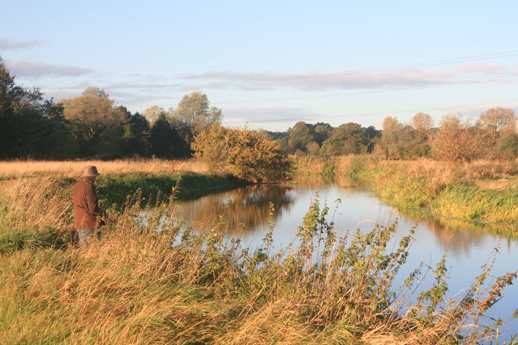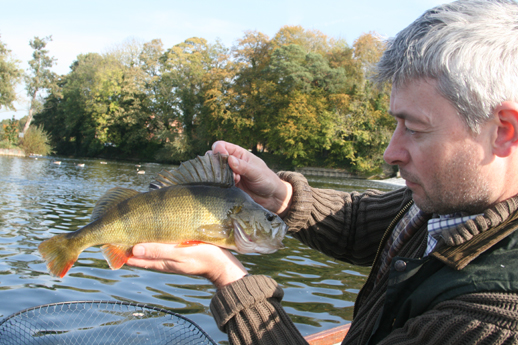
by Jon Berry.
It is summer now – or at least, a late-Spring impression of one, a heatwave to break the relentless rain – and we are back from London Town, simultaneously refreshed and exhausted from last night’s Variety Show. Outside the cottage window all is light and heat and optimism and, for the first time in a long time, my thoughts are of carp. The canal is barely a cast from our new front door, a neglected chain of locks and cuts, home to equally neglected fish that, when the sun gets up, rise from the mud and the macrophyte and boss the upper layers like battleships.
I shall fish for them soon. But, as any fly fisherman will tell you, all movement is backwards and forwards. The thought of those carp brings restless sleep but I can’t help but look behind me to a winter as varied as last night’s fare.
I spent the cold months on rivers, which is usual for me, and for most of that time I was alone. The solitude of meandering, moving water is always life-affirming, but the emptiness of those riverbanks was testimony to the current state of our flowing waterways and the preference of the angling majority, right now at least, for commercially-minded stillwaters. I like it that way.
My rivers and all others experience cyclical fortunes which, though never predictable, are wholly inevitable. Fishermen don’t always like them, but rivers don’t exist to keep fishermen happy. Those of us who choose to angle beside them know that there will be times when the rivers seem to burst with life, seasons when flows are high, weed growth is lustrous and the shallow gravels shimmer with the skittering of small fry, but equally we accept that there will be days, like now, when promising pools seem empty and every cast feels like an exercise in futility.
Some of this is natural, some of it not, and in the more hysterical corners of the angling community, horror stories abound of reintroduced otters emptying the rivers of big fish and cormorants gobbling up what the otters leave behind. There is a degree of truth in this, but the real story is that man’s meddling – through abstraction, the deliberate depletion of eels through commercial netting, the misuse and mismanagement of agricultural pollutants and the like – has done much to compromise the river habitat. Some over-enthusiastic otter introductions, well-meaning but in some cases unregulated and unsustainable, have tipped a balance that was already precarious. It is hardly the fault of the otters; we have created a scenario in which their instinctive behaviour has a disproportionate effect.
So for now, the rivers are lonely places to be, as beautiful as they ever were but less bountiful when it comes to catching fish. Nature will establish its own equilibrium in time, if we nurture when it is desirable and leave well alone when it is not. Until it does I shall wander the banks and enjoy what is there and accept what is not.
Steve Trafford joined me for the first two days of winter. We fished from Roger’s punt at Marlow Weir on the Thames, and though no giants graced our net we caught plenty of pike and perch. It was Steve’s first visit and he was bewitched by the capital’s river. Shoals of bleak appeared wherever we went, swarming to our boat to gorge on maggots and bread, and the predators lurked below them, spiralling up through the water to dine.
On the second day we went to the Avon below Malmesbury, and there the fish were harder to find. The river there has run low and clear all year and the fishing has been harder than I’ve ever known it. The local consensus seems to be that the otters have wrought havoc, but the full truth is more complex. The Avon’s decline predates otter-mania and the scarcity of fish owes as much to desperate water levels and the compromising of spawning sites as it does to furry interlopers. Steve was happy though; we fished the early morning under an orange sky and though we caught very little, the river was prize enough. Lunch was taken in a riverside pub and the beer was sublime.
At last light we wandered upstream to a tiny weir and trotted our floats in to the black. Once again we failed to hook any giants, but our floats did vanish occasionally, reappearing with perch and minnows attached. A fine mist descended as we walked across the fields to our car, and though we didn’t have the swaggering gait of triumphant hunters, we were happy with our day.
From January, I concentrated my attentions on one mile of a short, narrow Thames tributary. There, the weir and its run-off have recently reopened after sensitive restoration work. This has done much to beautify the landscape and, equally importantly from an angler’s perspective, has also restored the flows, the gravels and the deep runs which encourage fry recruitment, weed growth, oxygenation and all manner of other things upon which rivers depend. In its clear waters I could see shoals of perch, chub and gudgeon in abundance. There were big pike too, and the occasional gold-and-white flashes of rolling barbel. The fish were timid after months of neglect, preoccupied with the larvae-rich weed and riverbed, but a few were kind enough to take my bait.

On the final weekend of the coarse-fishers’ true season, a friend called to say that he had found a shoal of giant perch on the main river, a shoal we had both been looking for since the first frosts had arrived four months earlier. We met an hour before dawn for a last morning beside Old Father, crunching across meadows to a deep clear run where the stripes had gathered to prepare for spawning. Worms and floats were enough, and the last hours of the river’s year ended in a blaze of coppers, olives, reds and blacks.
Click here for previous episodes of A Mixed Bag.